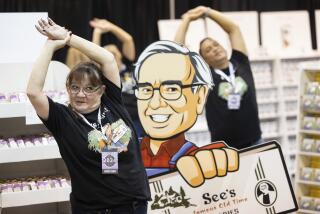David Sokol scandal dims merriment of Berkshire Hathaway stockholder meeting
- Share via
Reporting from Omaha — The annual stockholder meeting of Warren Buffett’s Berkshire Hathaway Inc. has long been more a party than a business event.
Disciples of the investment guru snap photos with their hero, eat rib eye at his favorite steakhouse and queue up to buy baubles at a jewelry store owned by the giant holding company. As many as 40,000 delight in a long weekend of wholesome fun that Buffett has dubbed the Woodstock of Capitalism.
And in an era in which bad business behavior is prominent in the public psyche, many Buffett admirers attend simply for life lessons from an octogenarian revered as much for his homespun values and ethical moorings as his financial wisdom.
“You can ask him how to raise your children,” said longtime Berkshire shareholder Andrew Kilpatrick.
But this year the annual spectacle, expected to fill Omaha’s Qwest Center on Saturday, is clouded by one of the biggest controversies Buffett has faced.
His presumed successor, David Sokol, resigned abruptly last month as the company disclosed that he pocketed a $3-million profit by buying stock in a business that Berkshire later agreed to acquire at his urging.
The episode has sparked rare criticism of Buffett himself, especially for initially downplaying Sokol’s actions.
“This is the stuff people expect to see from a large Wall Street firm, not Berkshire Hathaway,” said Charles Elson, a corporate-governance expert at the University of Delaware.
The controversy grew more stark this week as Berkshire accused Sokol of intentionally misleading Buffett, something a lawyer for Sokol has denied.
The matter is expected to dominate Saturday’s big event, in part because Buffett has refused to discuss it publicly until then. It also has revived questions about the future of Berkshire Hathaway after the departure of Buffett, 80, and Berkshire’s 87-year-old vice chairman, Charlie Munger of Pasadena, who is an investing legend himself.
“The meeting was going to be a real love fest, and the Sokol thing changed all that overnight,” said Jeff Matthews, a Buffett fan who wrote a book about the annual meetings.
It’s a unique tradition in the business world, as much social and cultural as financial.
Berkshire’s 24-page guide for attendees details three days of events and gives a list of Buffett’s favorite Dairy Queens. (The ice cream chain is owned by Berkshire.) A photo in the guide, in an ad for a knitting shop, depicts Buffett stitching a scarf.
Many celebrities — such as Glenn Close, Marvin Hamlisch and Michael Eisner — have attended over the years, said Kilpatrick, whose 1,250-page, 8-pound book is among the heaviest of the dozens of tomes written in homage to Buffett.
Each meeting begins with a short film — a kitschy spoof of Buffett and Berkshire produced for the event. One year it featured the stars of “Desperate Housewives” talking up bargains at the Borsheims jewelry emporium.
Buffett then spends six hours fielding questions from journalists and individual shareholders. In normal years they ask about who might succeed him as chairman and chief executive and about the outlook for a 78-company conglomerate, which employs nearly 300,000 and whose stock has returned a stunning 17% a year since the end of 1987, compared with a 10% annualized total return for the Standard & Poor’s 500 index.
For many attendees at the annual meeting, however, financial performance isn’t paramount. Some ask Buffett questions designed to elicit professional or personal guidance, giving the event a revival air.
“For many people, you come away changed as a person,” said Steve Wallman, a money manager from Middleton, Wis., who attends regularly.
Yet the Sokol controversy is casting a pall.
Buffett defended Sokol last month when breaking the news of the executive’s conduct. Sokol made a “passing remark” about owning Lubrizol Corp. stock and didn’t know that Berkshire might buy the company when he invested, Buffett wrote in a letter to shareholders, saying he didn’t think Sokol had broken the law.
To critics, that didn’t square with congressional testimony Buffett gave two decades ago, when he said he would be “ruthless” with anyone who lost “a shred of reputation for the firm.”
Even loyalists who are loath to criticize Buffett say he could have handled it better.
“I would have loved him to say something [more critical] because it’s his whole life and I don’t want to see one little issue tarnish it,” money manager Paul Lountzis said.
On Wednesday, Berkshire took a sharper tone, releasing a report accusing Sokol of intending to deceive Buffett about the timing and magnitude of his Lubrizol trades.
When he first pitched the acquisition, Sokol told Buffett he was familiar with Lubrizol from investing in it, the report says. Buffett, assuming Sokol was a long-term investor in Lubrizol, didn’t ask for details, according to the report.
But Berkshire later discovered that Sokol bought the stock after bankers at Citigroup Inc. recommended it as a takeover target, Berkshire said. Sokol also didn’t disclose that his trading occurred after Citigroup had approached Lubrizol about a deal, according to the report.
“It did not cross Mr. Buffett’s mind” that Sokol would have done that, the report said.
An attorney for Sokol said in a statement Wednesday that his client had been forthcoming about his Lubrizol investment and did not try to mislead Berkshire.
Many Berkshire shareholders are waiting to hear directly Saturday from the man known as the Oracle of Omaha.
No matter how the meeting plays out, however, the character of the annual affair is certain to change when Buffett is no longer in charge.
“It can’t be the same” without him, Lountzis said. “No one has his stature. No one has his mind. No one can replace him.”
More to Read
Sign up for Essential California
The most important California stories and recommendations in your inbox every morning.
You may occasionally receive promotional content from the Los Angeles Times.










